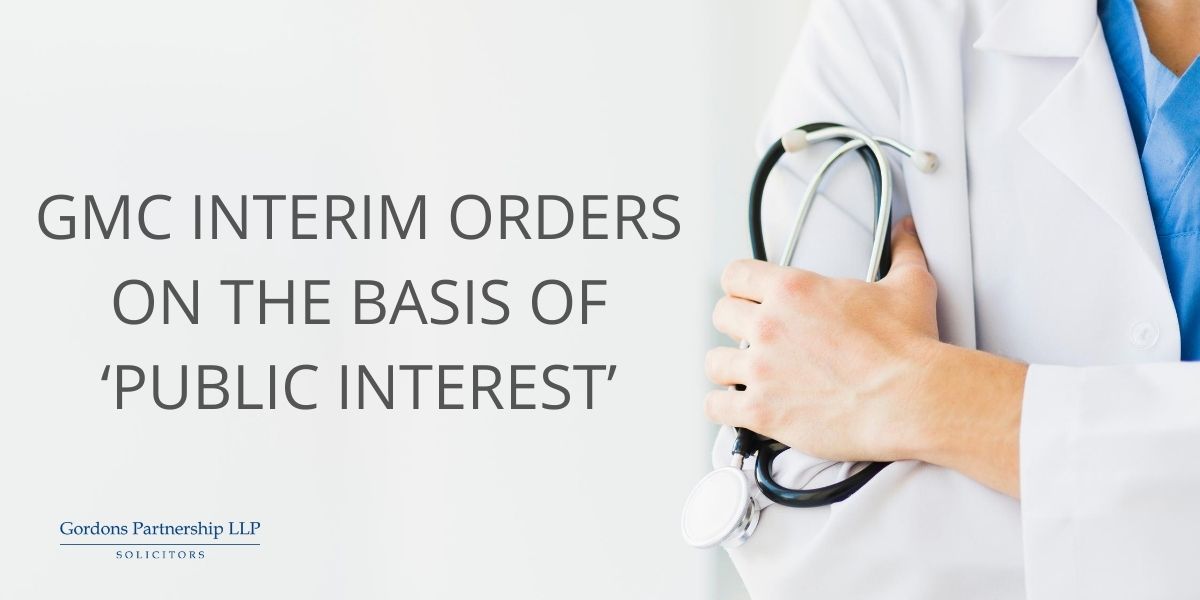This article explores the circumstances whereby a Practitioner’s GMC registration may be made the subject of an interim order on the basis that it is in the public interest.
Where a complaint is brought to the GMC, there will be an initial investigatory stage, following which, in the most serious of cases, there may be a referral to an Interim Orders Tribunal. The role of the Interim Orders Tribunal (“IOT”) is to consider whether the Practitioner’s registration should be restricted on an interim basis whilst the GMC’s substantive investigation is ongoing. This could be in the form of interim conditions on registration, for example the need to work under supervision, or a temporary suspension.
In order to impose an order, the IOT must be satisfied that a doctor’s fitness to practise may be impaired and that this poses a real risk to the members of the public, may adversely affect the public interest or the interests of the Practitioner. If this limb is satisfied, the IOT must also balance the interests of the doctor against the interests of the public and determine whether an interim order is necessary. The necessity of the order is assessed based on the seriousness of the risk to the public, whether public confidence in the profession would be damaged and whether such an order would be in the Practitioner’s best interests.
Public Interest
As above, one of the justifications for the imposition of an interim order is that it is necessary in the interests of the public to impose such an order. This is defined under GMC guidance as:
[the]interest to maintain public confidence and uphold the proper standards of conduct and behaviour.
This ground has historically proved to be complicated in identifying what the general public would consider to be the correct standard for the profession and how this should be weighed against the interests of the Practitioner. This is particularly the case where it is accepted that the other grounds for considering an interim order, such as for public safety, do not apply. However, there is now a body of case law on which to rely.
The precedent case on the imposition of interim orders on the basis of public interest alone is R (Sheikh) v GDC [2007] in which a dentist had been charged with and convicted of conspiracy to defraud. The dentist was sentenced to 12 months’ imprisonment suspended for 18 months and faced additional financial and cost orders. A referral to the GDC began and an interim order of suspension was imposed on the dentist on the grounds of the public interest alone. The interim order was appealed and later granted by the Court, on the basis that a suspension was unnecessary to protect the public interest. In its determination the Court and specifically stated that:
It is in my view likely to be a relatively rare case where a suspension order will be made on an interim basis on the grounds that it is in the public interest.
The key point raised at this hearing, and at subsequent hearings, is that the IOT must identify that the risk to the public interest is sufficiently serious to warrant an interim order and that the order is proportionate as a response to the degree of risk, as stated in Christou v Nursing and Midwifery Council [2016].
Overall, the general test that remains employed by the GMC’s IOT is set out in the case of NH v GMC [2016], which is to ask whether a member of the public would be surprised or offended to learn that a Practitioner was able to practice without restriction during the investigation process. Cases such as R v GMC and Christou merely confirm that where public concerns in respect to the integrity of the register would be tempered by the knowledge that a full investigation and hearing would follow, an interim order on the grounds of public interest should not accept in the most serious of cases be imposed. This is the case for both doctors and dentists when dealing with the GMC and GDC respectively.
Should you have any question regarding GMC Interim Orders on the basis of ‘public interest’ please don’t hesitate to contact our solicitors based in Guildford on 01483 451 900, email us on sols@gordonsols.co.uk or make an online enquiry and we will call you back.
Author: Larissa Glass
